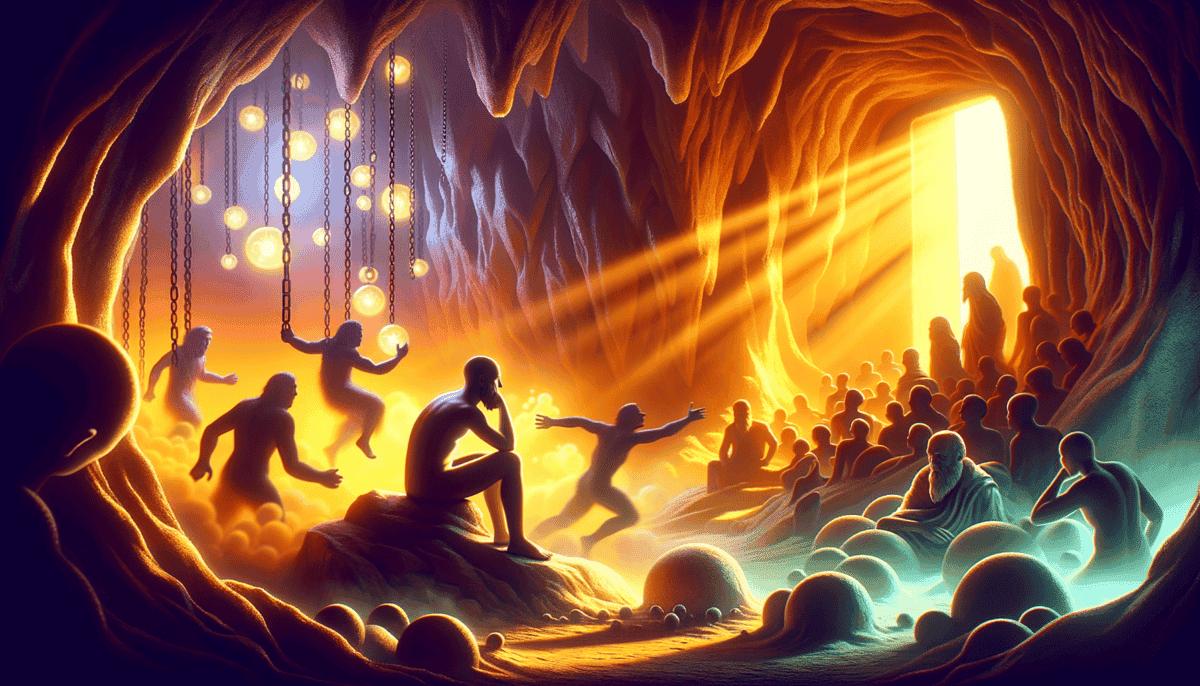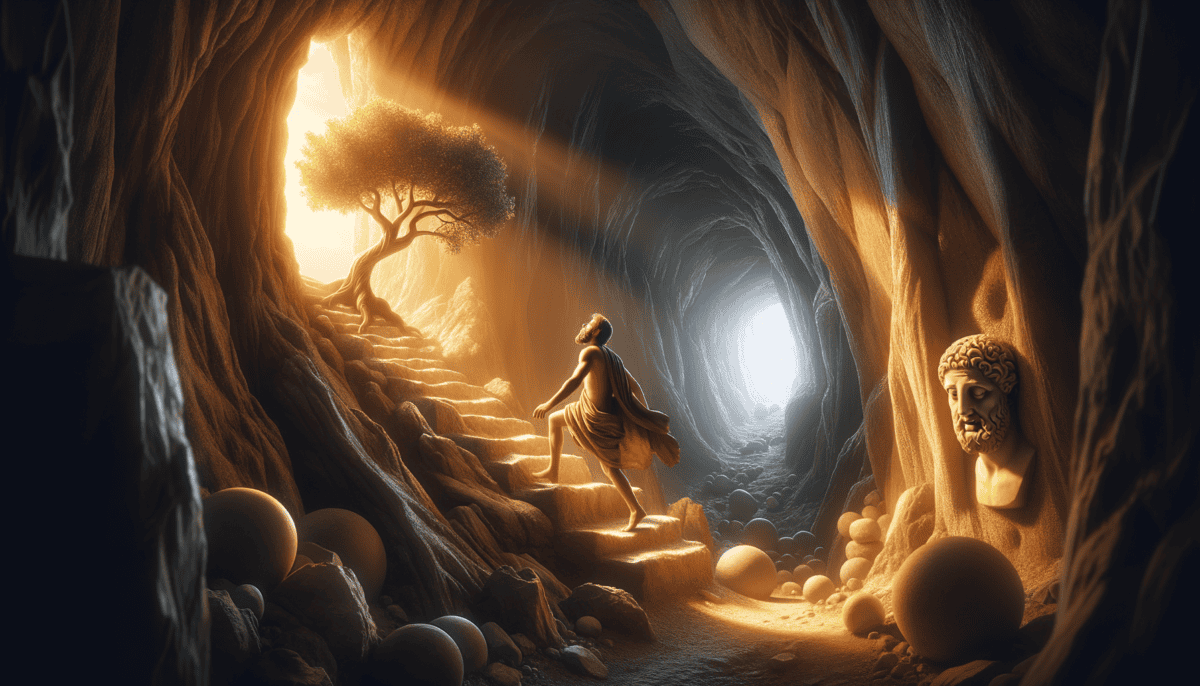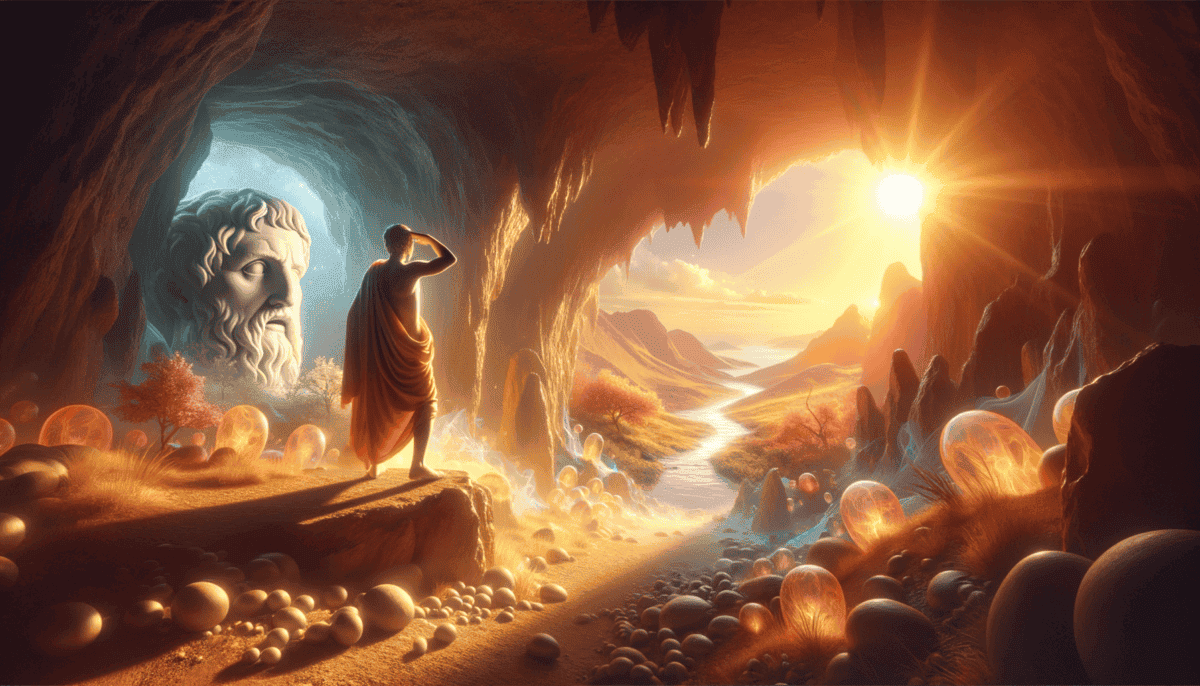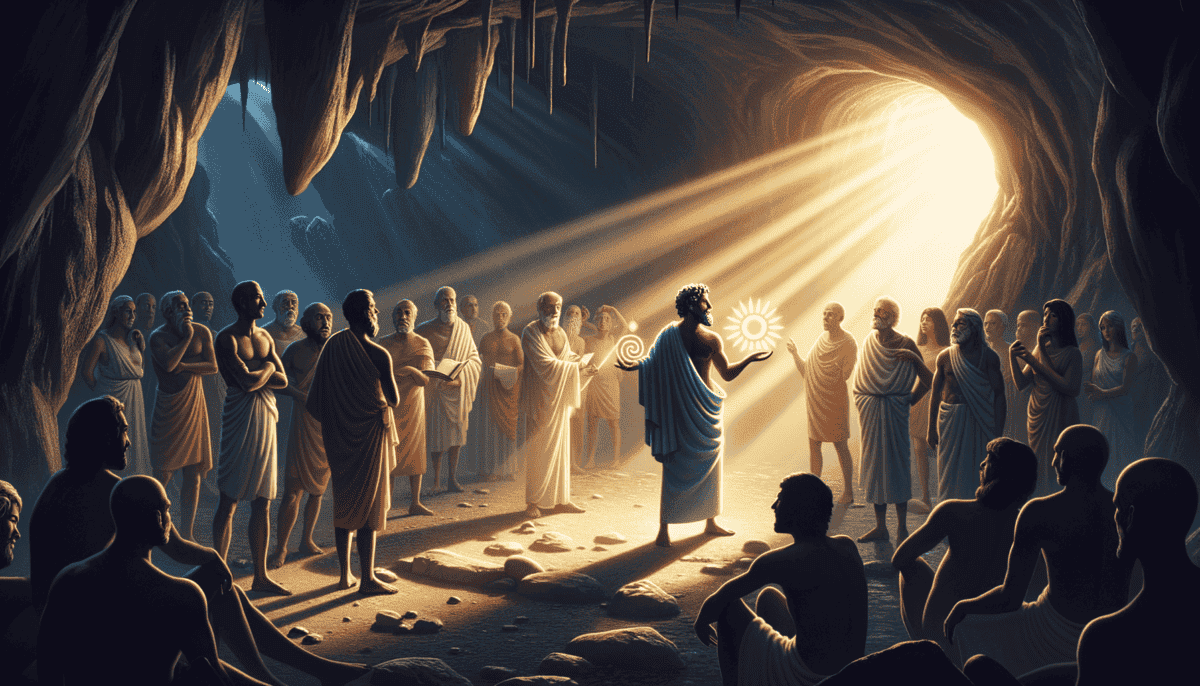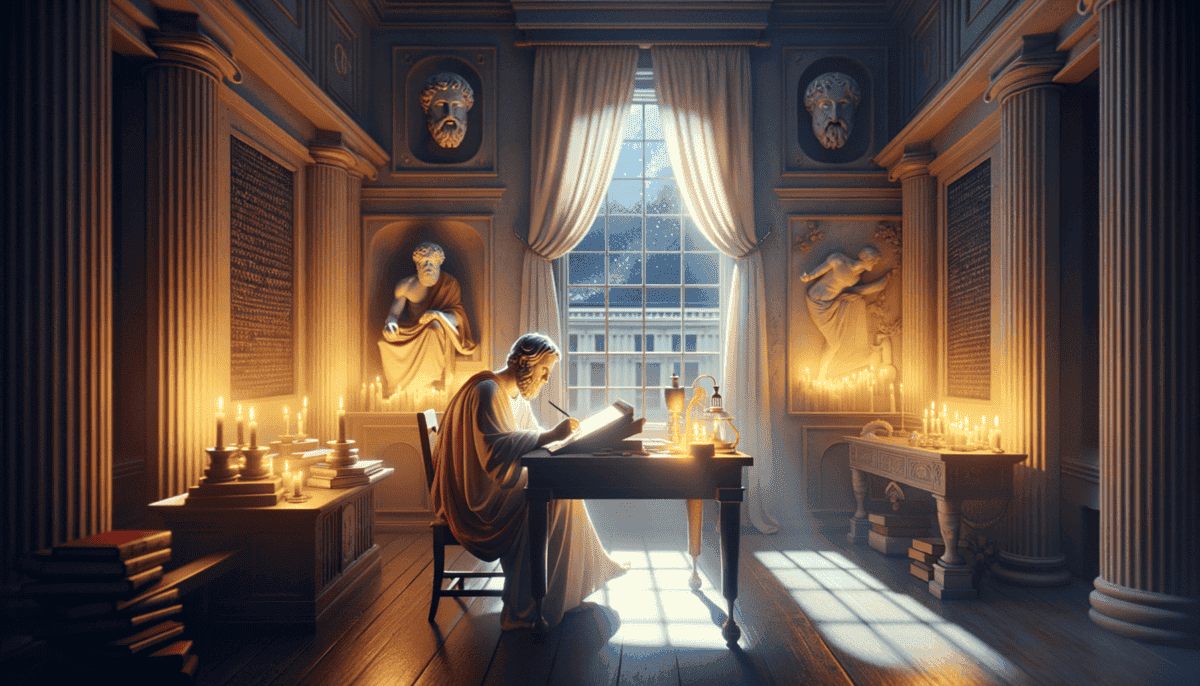The Cave of Darkness
In ancient Athens, young Plato sat in the dim light of his family's courtyard. The sun was setting, casting long shadows on the stone walls. He watched these shadows dance and wondered about their meaning.
"Mother, why do the shadows move like that?" asked Plato, his dark eyes full of wonder.
His mother smiled. "They follow the sun, my dear."
But Plato wasn't satisfied. He felt there was more to understand.
Every day, Plato watched the people of Athens go about their lives. They walked through the marketplace, traded goods, and talked about simple things. But something felt wrong to him. It was like everyone was looking at shadows on a wall, never seeing what made the shadows.
One morning, while walking through the busy streets, Plato heard a strong voice:
"Why do you accept what your eyes show you without asking questions?"
Plato turned to see an older man with a white beard. This was Socrates, though Plato didn't know it yet.
"What do you mean?" Plato asked.
Socrates smiled. "Look at that potter making a vase. What do you see?"
"I see him shaping clay," Plato answered.
"Ah, but what makes a perfect vase? Is it just the clay we see, or is there something more?" Socrates asked.
That night, Plato couldn't sleep. He kept thinking about what Socrates had said. The next morning, he found Socrates again.
"I want to learn more," Plato said eagerly.
"Then you must first understand that you are like someone in a cave, seeing only shadows on the wall," Socrates explained.
• What we see might not be all there is
• Questions are more important than quick answers
• True wisdom starts with knowing how much we don’t know
Days turned into weeks as Plato spent more time with Socrates. They walked through Athens, asking questions that made people think differently. Some people got angry when Socrates made them question their beliefs.
"Why do they get mad?" Plato asked.
"People don't like having their shadows disturbed," Socrates answered wisely.
The more Plato learned, the more he saw how most people lived like they were in a dark cave. They only saw shadows of the truth.
One evening, as the sun set over Athens, Plato watched the shadows grow longer on his courtyard wall. But now they meant something different to him. He knew there was more to learn, more to understand.
"Tomorrow," he whispered to himself, "I'll ask even more questions."
The stars came out over Athens, but Plato's mind was full of light. He was starting to see beyond the shadows, and his journey was just beginning.
“The shadows on the wall are just the beginning of wisdom,” Socrates had told him. “Your task is to turn around and see what makes them.”
That night, Plato dreamed of breaking free from chains he hadn't known were there. His quest for truth was just starting, and the shadows on the wall would never look the same again.
Breaking Free from Shadows
The morning sun peeked over Athens as Plato sat with Socrates in the marketplace. His head hurt from thinking so much about what was real and what wasn’t.
“Teacher,” Plato said, “if people only see shadows, how can we help them see more?”
Socrates picked up a small clay pot. “What makes this pot perfect?”
“Its shape?” Plato guessed.
“No, think bigger! There’s an idea of a perfect pot that exists somewhere. This pot is just trying to copy that perfect idea.”
Plato’s eyes got wide. He was starting to understand.
• Real things come from perfect ideas
• What we see is just a copy
• We need to look deeper to find what’s real
Later that day, Plato tried to tell his friends about these new ideas. They just laughed.
“You’re silly, Plato!” said his friend Marcus. “A pot is just a pot!”
“But what if it’s more?” Plato asked.
His friends walked away, shaking their heads. This made Plato sad, but it didn’t stop him from thinking.
“The truth isn’t always easy to see,” Socrates told him. “But that doesn’t make it less true.”
One afternoon, Plato watched children playing with puppets. The puppets made shadows on a wall. He jumped up, excited!
“Look!” he shouted. “The shadows aren’t the real puppets. Just like the things we see aren’t the real things!”
But some people in Athens didn’t like these new ideas. They said Plato and Socrates were causing trouble.
“Why do you make people question everything?” an angry man asked.
“Because questions help us find truth,” Plato answered bravely.
Each day, Plato felt like he was climbing out of a dark cave into bright sunshine. It wasn’t easy, but it was worth it.
He started teaching others about looking for perfect ideas behind regular things. Some people listened. Some didn’t. But Plato kept trying.
“Remember,” Socrates told him, “breaking chains takes time. But once they’re broken, you can’t put them back on.”
At night, Plato wrote down his thoughts about shadows and real things. He wanted to help others see what he was learning.
The moon rose over Athens, casting new shadows. But now Plato knew – shadows were just the beginning. The real adventure was finding what made them. And he was ready to keep looking.
The Climb to Light
Plato’s legs hurt as he climbed higher up the rocky path. The chains that had held him in place were gone, but his muscles still felt weak. ♂️
“It’s so bright!” he called out, shielding his eyes. The light ahead was stronger than anything he’d ever seen.
Socrates walked beside him, helping when the path got too steep. “Your eyes have never seen real sunlight before. Give them time to adjust.”
Plato stumbled on a rock. His hands were shaking. “Everything looks different up here!”
For the first time, he saw actual trees instead of just their shadows. He touched real flowers instead of just watching their dark shapes dance on the cave wall.
• Colors brighter than shadows
• Real objects he could touch
• Sounds clearer than echoes
• Fresh air instead of cave dust
“Look!” Socrates pointed to a rabbit hopping nearby. “Is this better than just seeing its shadow?”
Plato nodded, but his head hurt from all the new sights. Sometimes he missed the simple darkness of the cave.
“Learning truth can hurt at first,” Socrates said kindly. “Like eyes getting used to light.”
They rested under a real tree. Plato watched its leaves move in the wind. It was nothing like the flat shadows he used to see.
“I feel silly,” Plato admitted. “I thought shadows were all there was.”
“Don’t feel silly,” Socrates smiled. “You were brave enough to leave the cave. Many people never do.”
The sun was high now, making everything glow. Plato’s eyes were starting to see better.
A butterfly landed on his hand. In the cave, he would have only seen its shadow on the wall. Now he could see its beautiful colors.
“There’s so much to learn!” Plato said. “How can I remember it all?”
“Just keep looking with new eyes,” Socrates answered. “And keep asking questions.”
His old friends were still in the cave, watching shadows. He wanted to tell them about all the amazing things outside.
“Will they believe me?” he asked Socrates.
“Some will, some won’t. But you must try to share what you’ve learned.”
As the sun began to set, Plato looked back down the path they’d climbed. The cave entrance looked so small from up here.
Tomorrow they would climb even higher. There was still so much more to see and learn. Plato’s legs were tired, but his mind was wide awake.
The World in Sunlight
The morning sun warmed Plato’s face as he stood at the top of the hill. His eyes didn’t hurt anymore when he looked at bright things.
“Everything is so clear up here!” Plato spread his arms wide, feeling the gentle breeze.
Socrates sat nearby, watching his student explore. “What do you see now that you couldn’t see before?”
Plato picked up a smooth stone and turned it in his hands. “In the cave, I only saw flat black shapes. But now I can see…”
• Round stones with sparkles
• Birds flying in the sky
• Water that sparkled like stars
• Clouds that changed shape
“The shadows were just copies,” Plato said excitedly. “Not the real things at all!”
“You’re beginning to understand true knowledge,” Socrates smiled. “The real world is much bigger than shadows.”
A group of children played nearby, their laughter echoing across the hillside.
“I want to tell everyone in the cave about this,” Plato said. “They need to know what they’re missing!”
Socrates put a hand on his shoulder. “It won’t be easy. They might not want to leave their safe, dark cave.”
“But the truth is so beautiful!” Plato watched a butterfly dance through the air.
He spent the whole day exploring. Each new discovery made him more excited to share what he learned.
“I could draw pictures,” Plato suggested. “Or tell stories about the sun!”
“Good ideas,” Socrates nodded. “But remember how hard it was for you at first?”
Plato remembered his aching eyes and shaking legs. “Yes, but it was worth it.”
As the day went on, Plato wrote down his ideas in the soft dirt with a stick. He had to find ways to explain what he saw.
“Maybe I could build a school,” he said. “A place where people can learn about real things!”
Socrates beamed with pride. “Now you’re thinking like a true teacher.”
The sun began to sink lower in the sky, painting the clouds in beautiful colors.
“Tomorrow we should start planning how to help others,” Plato said. “Everyone deserves to see these amazing things!”
“Yes,” Socrates agreed. “But first, what else can you learn from watching that sunset?”
Plato sat quietly, taking in every detail of the colorful sky. He had many new ideas to share with his friends in the cave.
The Hard Road Home
Plato walked carefully down the rocky path back to the cave. His heart beat fast as he thought about telling everyone what he had seen.
“I’m scared,” Plato whispered to Socrates. “What if they don’t believe me?”
Socrates squeezed his shoulder. “Be brave. Remember what you learned in the sunlight.”
Inside the cave, people sat in their usual spots, watching shadows dance on the wall.
“Friends!” Plato called out. “I have amazing things to tell you!”
“Shh!” someone hissed. “We’re trying to watch the shadow show!”
But Plato wouldn’t give up. He picked up a rock and held it high. “Look! This is what makes the shadow you’re seeing. It’s round and rough and real!”
• Some covered their eyes
• Others laughed at him
• A few looked curious
• Most ignored him
“Stop telling silly stories,” an old man grumbled. “The shadows are all we need to know.”
Plato’s heart sank, but he remembered the beautiful sunset. He had to try harder.
A young girl looked up. “What’s a color?” she asked.
“It’s like…” Plato paused. How could he explain red to someone who only knew gray?
“He’s gone crazy,” someone shouted. “Too much time with that troublemaker Socrates!”
But Plato noticed a small group gathering around him. Their eyes were bright with questions.
“The Academy,” he would call it. A safe place for asking big questions. ️
“I’ll help,” said the curious girl. Others nodded too.
Some people still shouted angry words. They didn’t want things to change.
“This is just the beginning,” Socrates reminded him. “Change takes time.”
That night, Plato drew pictures in the dirt, planning his school. More people came to watch.
“Tell us more about the sun,” someone whispered.
Plato smiled. Maybe he could help them see the truth, one person at a time.
In the shadows of the cave, a small light of hope began to grow.
As people drifted off to sleep, Plato heard the curious girl telling her friends about colors she had never seen.
Outside the cave, the stars twinkled, waiting to be discovered. ⭐
A New Dawn of Wisdom
Years passed like flowing water. Plato’s Academy grew bigger and stronger. ️
“Teacher Plato,” called Maya, the once-curious girl who was now his best student. “Tell us again about your journey out of the cave.”
Plato smiled at the circle of bright faces around him. “The truth was hard to see at first, like looking straight at the sun.” ☀️
“But the more we learn, the clearer everything becomes,” Maya added wisely.
In the courtyard, students practiced asking big questions:
• Look beyond what you first see
• Ask “why” and “how”
• Share what you know with others
• Never stop learning
Even some of the old cave dwellers started visiting the Academy.
Plato wrote many books about what he learned. He called them “dialogues” because they showed people talking and thinking together.
“Knowledge is like a torch,” he told his students. “When you light someone else’s torch, your own flame doesn’t get smaller.”
People came from far away to study at the Academy. Each person who learned the truth helped others see it too.
One evening, Plato stood on a hill overlooking Athens. He remembered the scared young man he once was, seeing only shadows.
“Look how far we’ve come,” he said to himself, watching students walk home with scrolls under their arms.
The cave still existed, but fewer people lived there now. More chose to climb into the sunlight.
Every day, new questions led to new discoveries. The journey never really ended.
As the sun set over the Academy, Plato thought of all the future students who would seek the truth.
“What will they discover?” he wondered, smiling at the stars beginning to shine.
The answer was as vast as the sky above: They would discover everything they dared to question. ⭐
And somewhere, in every time and place, people would keep breaking free from their caves, stepping into the light of understanding.
For the greatest journey is the one that leads us from darkness to knowledge, from shadows to truth.


